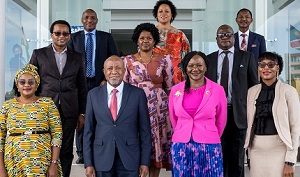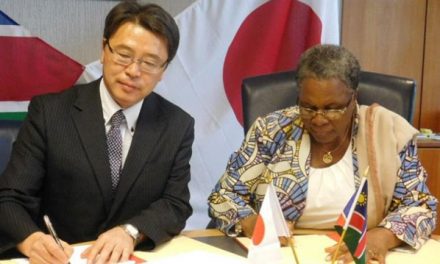
Streamline SACU trade policies with national policies says VP

The Vice President, Nangolo Mbumba has urged the SACU Secretariat to ensure that the body’s trade policies are entrenched and streamlined with Namibia’s national policies with a clear strategy that promotes coherence across all sectors to ensure that the country maximises its benefits from such arrangements.
Mbumba, who paid a courtesy visit to the SACU Head Office in Windhoek this week said, the government prioritizes regional integration efforts, as a credible strategy for tackling the country’s development challenges.
“It (regional integration) is an ideal platform for promoting large scale investment and economic efficiency required for economic growth and employment creation,” Mbumba said.
He said Namibia recognises that its continued involvement in regional integration efforts by being a member of SACU, is a strategic response to the growing demand for market enlargement within the context of globalisation.
“As you are all aware, post-COVID-19 recovery requires a committed focus on economic transformation, competitiveness, collaboration and diversification. These are all achievable through strategic partnership and enhanced cooperation going forward,” he added.
During the visit, Mbumba familiarized himself with the work programme and priorities of SACU and emphasized the country’s commitment to the Union and its work. The Vice President was accompanied by several officials from various government departments.
Mbumba’s visit follows similar high-level visits by King Mswati III of Eswatini; President Ian Seretse Khama, former President of Botswana; and Dr Mokgweetsi Masisi, President of Botswana, who visited the Secretariat in 2017, 2018 and 2020, respectively.
According to the Executive Secretariat of SACU, Paulina Elago, In the area of Trade Facilitation and Logistics, SACU seeks to create a seamless trade environment for cross-border movements.
She said this will be done through the application of innovative and emerging technologies to streamline processes, enhance collaboration, while also detecting and deterring illicit trade in goods within the Common Customs Area.
“It will also address obstacles and hindrances facing businesses that are moving goods across the borders in the Common Customs Area and beyond. The goal is to develop trade facilitation solutions that are practical, transformational, measurable, and geared towards enhanced efficiency and reduced transaction costs,” Elago said.











































